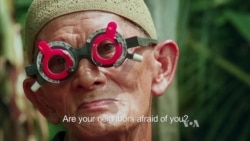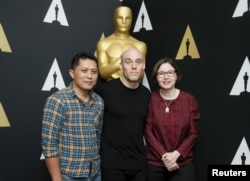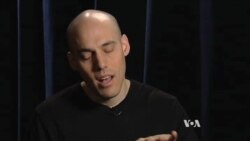In the acclaimed documentary "The Look of Silence," Joshua Oppenheimer explores the aftereffects of the 1965 genocide in Indonesia.
The Oscar-nominated filmmaker throws light on the human condition in a persistent climate of fear and silence caused by the unanswered killings of between 500,000 and 1 million people.
The murderers have not faced justice for half a century because the political regime still protects them. The camera follows protagonist Adi Rukun, an Indonesian optometrist, as he confronts the men who murdered his brother, Ramli, two years before Adi was born.
There is something comical when Rukun fits one of the killers with optometrist's glasses. That man looks ancient and the glasses are clunky and shiny red, something a child would wear. But there is nothing funny about the old man's demeanor. A former death squad leader, who helped the army kill 10,500 people at a single clearing on the riverbank of North Sumatra's Snake River, he's defiant, unapologetic about what he did 50 years ago to "the communists." The poor workers dared to unionize.
"My neighbors are scared of me. They know they are powerless against me," he says.
Draining experience
"The Look of Silence" explores the psyches of those who committed genocide and have gone unpunished. Filmmaker Oppenheimer, a soft-spoken, intelligent man, tries to relate the environment he encountered over 10 years ago when he was filming Rukun's interviews with his brother's killers and the killers of tens of thousands of others.
“My God! It’s like I've wandered into Germany 40 years after the Holocaust if the Nazis have never been removed from power and if the rest of the world had celebrated the Holocaust and participated in it while in took place," he says.
Oppenheimer shows how, armed with self-righteous conviction, the perpetrators celebrate a victor’s mythology that justifies their atrocities. The filmmaker captured their boastful testimonies for the world to watch. The camera follows down to the river two men, now old and frail, recounting with obvious glee and jovial tones the details of their grisly killings. They demonstrate how deftly they hacked their victims to pieces while the latter begged for mercy.
"But we don’t care," says one of the perpetrators. "In fact, we beat him to shut him up because his screams could frighten my men."
Few answers
"For the vast majority of the survivors, there was no confirmation that their loved ones had been killed," the filmmaker says. "Their loved ones were taken to rivers, slaughtered. Bodies would drift out to sea and the families were never told what happened and I’ve tried to create this beautiful but haunted space that makes the violence of what happened all the more unbearable."
Oppenheimer says he felt that, along with the killers' brazenness, it was crucial to show the world the fear and silence people in the area have had to live with for half a century. Local witnesses to Ramli Rukun's death would refer to him as the example of what happened to their own loved ones, tens of thousands missing in the vicinity and at least hundreds of thousands of others throughout Indonesia.
Adi Rukun grew up listening to his mother talk about Ramli's death every single day. Her burden, and those of others, became his burden. When he got the chance to conduct these interviews for "The Look of Silence," it was cathartic but also the most difficult thing he'd ever done, he says.
"You have to be face to face and to hide your emotions towards someone who not only murdered so many people, but also your own family. It was very emotionally draining," Rukun says. "After each interview, without Joshua knowing, I would always lock myself away for 30 to 45 minutes just to calm myself."
Challenging filmmaking
Rukun says he and the director were in constant danger of being arrested, attacked or even killed.
"In every interview, we would arrive and leave in different cars," he says. "In one instance, [a] perpetrator's son called the police so we ran as quickly as possible."
WATCH: Interview with filmmaker Joshua Oppenheimer
Oppenheimer says they kept bags packed at all times, ready to leave the country if they sensed danger. Even now, as a safety precaution, his family members have been relocated to another part of Indonesia and have visas to Denmark in case they need to flee overnight. Also, they are protected around the clock by a team of bodyguards.
His work offers some protection, Oppenheimer says. Both "The Look of Silence" and his previous film, "The Act of Killing," have gotten so much international acclaim that neither the Indonesian government nor regional powers can hurt the family without creating an international scandal.
Oppenheimer says "The Look of Silence" shines a light on systemic corruption and intimidation in Indonesia, and breaks a 50-year silence about the genocide committed there.
If "those stories are powerful, if they really are impactful, it’s because there’s a moment when you watch the film where you recognize yourself," the filmmaker says. It's "where you feel: 'Oh no! Is this what we are as human beings? Is this what we can do to each other? Is this what it would mean to have to live like Adi's parents, in fear and silence for half a century?' Yes, it is."







